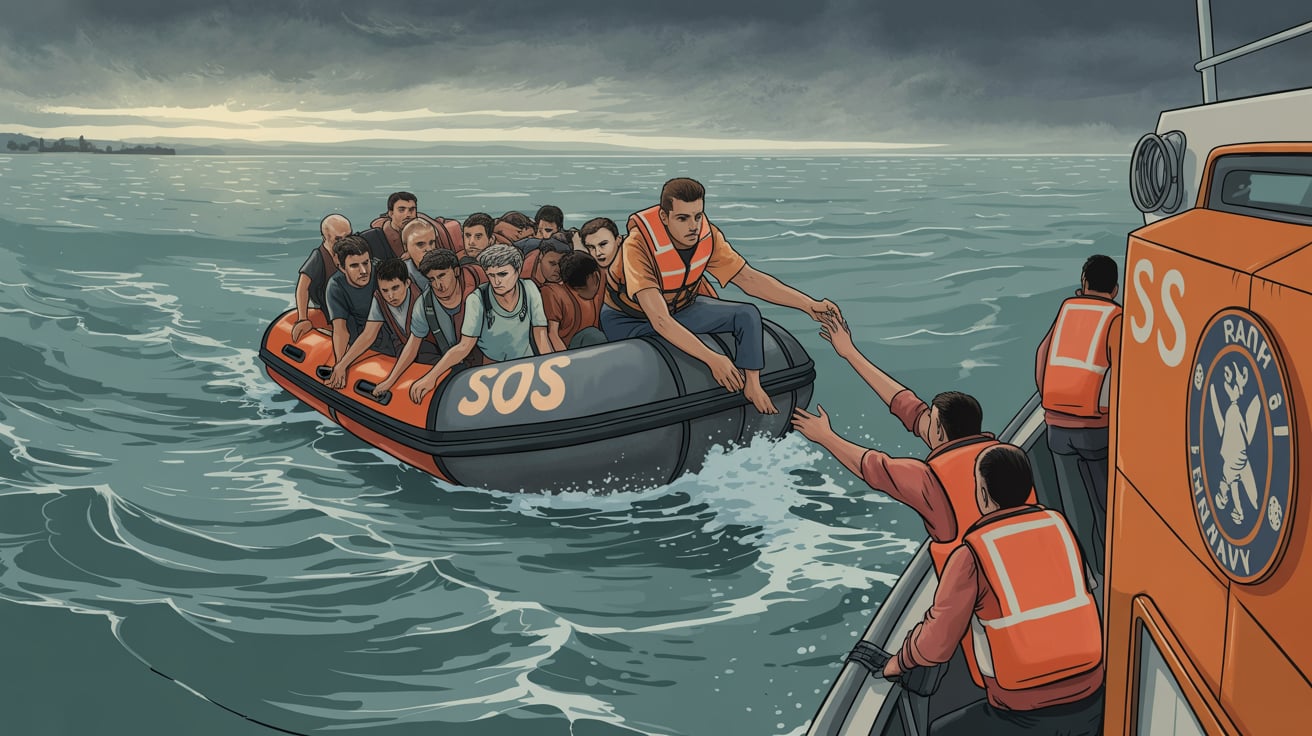French coastal authorities reported that nearly 200 migrants attempting to cross the English Channel from France to Britain were rescued between late Friday and late Saturday.
A total of 184 individuals were saved during four separate rescue operations, according to a statement issued Sunday by the maritime prefecture for France’s Channel and northern region.
One rescue involved a boat carrying 61 people that became stranded after its engine failed. In another case, nine people called for help while at sea.
So far this year, at least 15 people have died attempting the dangerous Channel crossing, according to an AFP tally based on official data. The English Channel remains one of the busiest and most hazardous maritime routes in the world.
UK and EU Unveil Tougher Measures to Curb Irregular Migration
In May, British Prime Minister Keir Starmer announced stricter policies aimed at addressing both regular and irregular migration, as his government seeks to counter declining support in the face of rising pressure from the hard right.

Among the proposed measures is the potential establishment of overseas centres to accommodate migrants whose asylum applications have been rejected.
Meanwhile, the European Union has introduced new plans to facilitate the transfer of asylum seekers to designated non-EU countries, as part of a broader overhaul designed to reduce irregular migration across the bloc.
Crisis in the Channel: Nearly 200 Migrants Rescued as UK and EU Toughen Migration Policies
The ongoing migration crisis in Europe took a dramatic turn over the weekend as French coastal authorities announced the rescue of nearly 200 migrants attempting the perilous journey across the English Channel. Between late Friday and late Saturday, 184 people were saved during four separate operations coordinated by the maritime prefecture for France’s Channel and northern region. The rescues underscore the human stakes involved in one of the world’s busiest and most dangerous maritime corridors, even as European leaders pivot toward stricter migration control policies.
A Surge in Rescue Operations
The weekend’s rescue efforts provide a stark reminder of the growing number of migrants who continue to risk their lives in hopes of reaching Britain. In one operation, authorities responded to a vessel carrying 61 people that had become stranded after its engine failed mid-crossing. In another case, nine individuals at sea managed to send a distress signal, prompting immediate intervention.
These incidents are part of a broader pattern that has emerged over the past several years. Since 2018, there has been a marked increase in small boat crossings from France to Britain. Driven by war, poverty, and political instability in regions such as the Middle East, sub-Saharan Africa, and parts of Asia, thousands of people continue to seek refuge in Europe—often via dangerous, unauthorized routes.
So far this year, at least 15 people have died attempting to cross the Channel, according to data compiled by Agence France-Presse (AFP) from official sources. And while that number may seem small relative to the scale of global migration, each loss of life highlights the severe risks faced by those fleeing desperate circumstances. Maritime officials warn that the number of deaths could rise during the summer months when weather conditions often encourage more crossings.
A Perilous Pathway
The English Channel is not only one of the busiest shipping lanes in the world, but also one of the most treacherous for small, overcrowded boats. Strong currents, unpredictable weather, and heavy commercial traffic pose constant hazards. Despite these dangers, the route has become increasingly popular among migrants due to increased security and restrictions at land borders.
Authorities on both sides of the Channel remain locked in a cycle of surveillance, rescue, and enforcement. French and British coastguards frequently coordinate to prevent tragedies, but the sheer volume of attempts strains available resources. As a result, many believe that enforcement alone cannot resolve the underlying causes of irregular migration.
Political Response: A Harder Line from London
In response to mounting political and social pressures, particularly from right-wing factions, the British government has begun to adopt a much firmer stance on migration. In May, Prime Minister Keir Starmer unveiled a new set of proposals aimed at tightening both regular and irregular migration. The initiative comes at a critical time for the Labour-led administration, which is grappling with declining public approval and increasingly vocal criticism from conservative and far-right parties.
Among the proposed measures is the establishment of overseas processing centers where individuals whose asylum claims are rejected could be sent. Though details remain scarce, the concept mirrors controversial strategies previously proposed by the Conservative Party, such as the now-stalled Rwanda deportation plan. Critics have raised concerns about the legal and ethical implications of such arrangements, arguing that they may violate international obligations under the 1951 Refugee Convention.
The government insists that these reforms are necessary to restore public confidence in the immigration system and to deter what it terms “illegal migration.” However, human rights advocates and migrant support organizations warn that these policies could criminalize vulnerable individuals and further endanger those in need of protection.
Europe’s Migration Dilemma
The United Kingdom is not alone in reassessing its migration policies. Across the European Union, member states are increasingly focused on stemming irregular migration while reforming the asylum system. In a parallel move, the EU has advanced new plans that would allow for the transfer of asylum seekers to designated third countries outside the Union.
These policy shifts form part of a larger overhaul known as the New Pact on Migration and Asylum, which seeks to balance solidarity and responsibility among EU member states. Under the pact, countries that refuse to accept asylum seekers would be required to contribute financially or provide support in other ways.
Critics argue that this system effectively enables wealthier countries to “opt out” of their humanitarian responsibilities, while disproportionately burdening frontline nations such as Italy, Greece, and Spain. Proponents, however, claim that the new approach provides much-needed flexibility and coordination in managing one of the most complex challenges facing the bloc.
A Growing Humanitarian Challenge
The recent surge in Channel crossings—and the corresponding increase in rescue operations—underscores the humanitarian dimensions of Europe’s migration crisis. For many migrants, the journey to Britain represents a final, desperate effort to escape conflict, persecution, or economic collapse. Many have already endured harrowing journeys across multiple countries and dangerous terrains before reaching the French coast.
Migrant advocacy groups continue to call for more humane solutions that prioritize the safety and dignity of asylum seekers. They argue that tougher border controls and externalization policies do little to address root causes such as war, corruption, and climate-induced displacement. Instead, they urge governments to expand legal pathways for migration, increase resettlement quotas, and invest in long-term development programs in migrants’ countries of origin.

Balancing Security and Compassion
The policy debate now taking place across Britain and the EU reflects the broader tension between national security and human rights. Governments face pressure to protect their borders and respond to domestic political concerns, but must also adhere to international norms and humanitarian obligations.
While there is widespread agreement on the need for reform, opinions diverge sharply on the best path forward. Some argue that deterrence-based strategies, including deportation and detention, are essential to maintaining public order. Others believe that such measures risk undermining democratic values and could lead to further instability in migrant-sending regions.
The evolving policies from London and Brussels mark a clear hardening of tone, but their effectiveness remains uncertain. Experts caution that without international cooperation, comprehensive development aid, and robust legal protections for migrants, stricter controls may simply push migration further underground, increasing the risks of exploitation, trafficking, and death.
A Necessary Solution
Ultimately, addressing the complex challenges of migration will require more than national legislation or short-term crackdowns. The issue is inherently global, shaped by forces such as armed conflict, environmental degradation, economic inequality, and political repression. No single country—however wealthy or well-defended—can resolve these dynamics in isolation.
Diplomatic engagement, regional cooperation, and shared responsibility must be central to any long-term strategy. Programs that offer alternatives to irregular migration—such as humanitarian visas, labor mobility agreements, and refugee sponsorship initiatives—could reduce the appeal of dangerous routes like the Channel crossing.

Multilateral institutions, including the United Nations and the International Organization for Migration (IOM), continue to advocate for a more coordinated response. They stress the importance of data sharing, capacity building, and the protection of migrant rights as key pillars of sustainable migration management.
Conclusion: A Crisis at the Crossroads
As the summer migration season approaches, the English Channel is once again becoming a focal point of humanitarian concern and political controversy. The weekend’s rescue of nearly 200 migrants adds urgency to a debate that has long simmered across Europe: how to respond effectively and humanely to the realities of global displacement.
With both the UK and EU unveiling stricter policies aimed at deterring irregular migration, the question remains whether these strategies will offer real solutions—or simply shift the burden elsewhere. As governments tighten their borders, the responsibility to uphold human rights and protect those in need grows even more critical.
The challenge of managing migration is unlikely to disappear anytime soon. But the choices made now—whether driven by fear, compassion, or pragmatism—will shape the future of Europe’s borders and its moral compass for decades to come.
Conclusion
The recent surge in migrant rescues in the English Channel, combined with new policy shifts in the UK and EU, highlights the growing urgency surrounding migration management in Europe. As governments grapple with humanitarian concerns, political pressures, and border security, the challenge remains to find solutions that are both effective and compassionate. The evolving strategies signal a toughening stance, but the success of these measures will ultimately depend on international cooperation and a balanced approach to human rights and migration control.
The Barron’s news department was not involved in the creation of the content above. This article was produced by AFP. For more information go to AFP.com.




3 thoughts on “Nearly 200 Migrants Rescued from Small Boats in the English Channel”